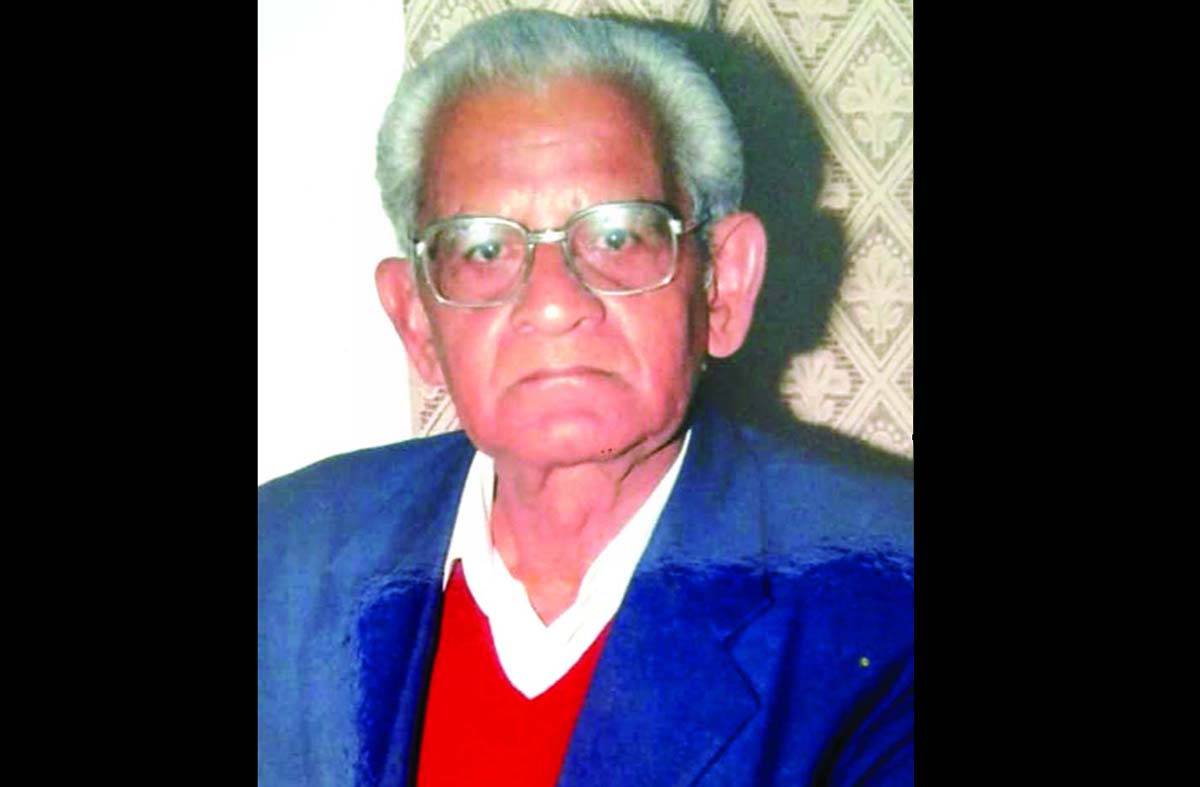Rajeshwar Singh ‘Raju’
Writing has been his passion. He has been living with it for the last so many years now and is enjoying every bit of it. He loves to give words to his imagination and observations resulting in thought provoking and captivating literary pieces which are critically acclaimed as well.
He is Kewal Krishan Sharma popularly known as K. K. Shakir in literary arena, an eminent writer in Hindi, Punjabi, English, Urdu and Dogri language.
Shakir was born on November 11th’ 1936 in the family of Pt. Jagan Nath Sharma and Ram Pyari at R.S.Pura Jammu. Right from an early age he had an inclination towards reading that inspired him to write, and his first ever short story written in Urdu language was published in ‘Tarjaman’ published from Ludhiana way back in 1954.
With the passage of time, he started writing articles on varied subjects and poetry also that got published frequently in all three editions of J & K Academy of Art, Culture & Languages’ bi-monthly magazine ‘SHEERAJA’ in Hindi, Dogri and Punjabi, Information Department’ Hindi magazine ‘YOJNA’ and Dogri magazine ‘LOO’, besides some vernacular papers.
While working as a teacher, it was quite tough to extract time for quenching his thirst for writing. However he maintained a beautiful equilibrium between his profession and passion. He earned respect from his students and his tiring and inspirational services as a teacher were also acknowledged by all quarters. But after having retired as a Senior Lecturer, he has devoted himself entirely to literature.
His first book ‘PARCHHAWAN” a collection of poems in Punjabi was published in 1974. Till date he has more than 14 books published in different languages that include ‘Dharti De Geet’ and ‘Jhanjharan’ _ collections of poetry in Punjabi, ‘Gulshan Gulshan_ poetry and ‘Yeh Log’_ Short Stories in Urdu, ‘Sarkande’_ novel and ‘Hirkhay Di Dor’_ poetry in Dogri, ‘Jammu Ke Pracheen Mandir’, ‘Jammu Ke Dharmik Sathal’, Jammu Darshan’, ‘Jammu Ke Pavitar Smarak’, ‘Jammu Ki Vibhutiyan Evm Sanskritik Paridrashya’_ based upon the prominent personalities, historical monuments and places with cultural references in Hindi, ‘Changing Faces’, ‘Jammu Heritage And Culture’ in English language etc. It is pertinent to add here that ‘Jammu Ke Pracheen Mandir’ has been awarded by Central Hindi Directorate, Ministry of HRD Government of India in 2015.
Shakir has the privilege of writing on the subjects that many writers aspire to. But a lot of research work has to be made for such initiatives. However, after the work is over and gets documented in the form of a book, it gives strange feel of contentment not only to writers but the readers also feel proud.
Shakir’s works predominantly revolve around the eminent personalities of historical significance and the religious and historical places of Jammu region. It will not be unfair to add here that the way he has put in best efforts with all dedication and commitment, he has carved a niche for him self in literary circles.
In addition to it he has been a regular participant in numerous literary Conferences, Seminars, meetings organized by Jammu & Kashmir Academy of Art, Culture & Languages, Information Department of J & K, Department of Archives, Rashtra Bhasha Prachar Samiti and other literary organizations. At the same time he has been a regular contributor as a poet and talks in different languages on All India Radio Jammu, Doordarshan Kendra Jammu and Doorsdarshan Kendra Srinagar.
He has been honoured and awarded by several organizations for his contributions in literature and as a teacher. The major ones include ‘Best Teacher’s National Award by Sh. R. Venkatraman, President of India in 1990, Best Teacher’s State Award-1978, Ist. Gandhi medal by Gandhi Samarak Nidhi J & K-1969, Awarded by Central Hindi Directorate, Ministry of HRD Government of India-2015, , Dogra Brahmin Pratinidhi Sabha-1991, Punjabi Sahit Sabha R S Pura, Sahitya Shree by Nami Dogri Sanstha Jammu, and Indian Cultural Forum etc.
In a conversation, Shakir was of the opinion that he is fond of visiting the historical places and writes about the cultural significance of same.
It’s a matter of concern that when we stress national character and of preserving our heritage, the present generation is not aware of the real heroes who have played pivotal role in building up society and working for welfare of region and the inhabitants. Even If they are familiar with some prominent faces, they don’t know their momentous contributions. At the same time there are so many who deserve to be in the memories but ironically don’t find considerable mention. Then it becomes moral obligation of writers to go for extensive research and pen down their contributions. The historical monuments and other places of religious or cultural importance should also be documented so that the generations should have an access to it.
The efforts made by Shakir for such a noble cause need all appreciation. The youths should study the rich cultural heritage of their native places and the inspiring works rendered by the pious souls in the past and feel proud of their history. But the history needs honest efforts for survival also.
It is well said that the generations which are not bothered about their past history get lost in the wheel of time whereas those which are concerned do excel and are talked about for ages. In this context, we should seek lesson from Western Countries who are very much concerned about their roots and try their level best to preserve their heritage and ensure that it should never fade away from their memories.
Literature pertaining to cultural identity deserves to be in the libraries of all schools, colleges, Universities, District Libraries so that students representing young generation and others also should get to know about their roots, elders and cultural heritage.
We may hope that Shakir will go on documenting rich cultural heritage of Dogras in future also and others will also get inspired for same.
Trending Now
E-Paper


